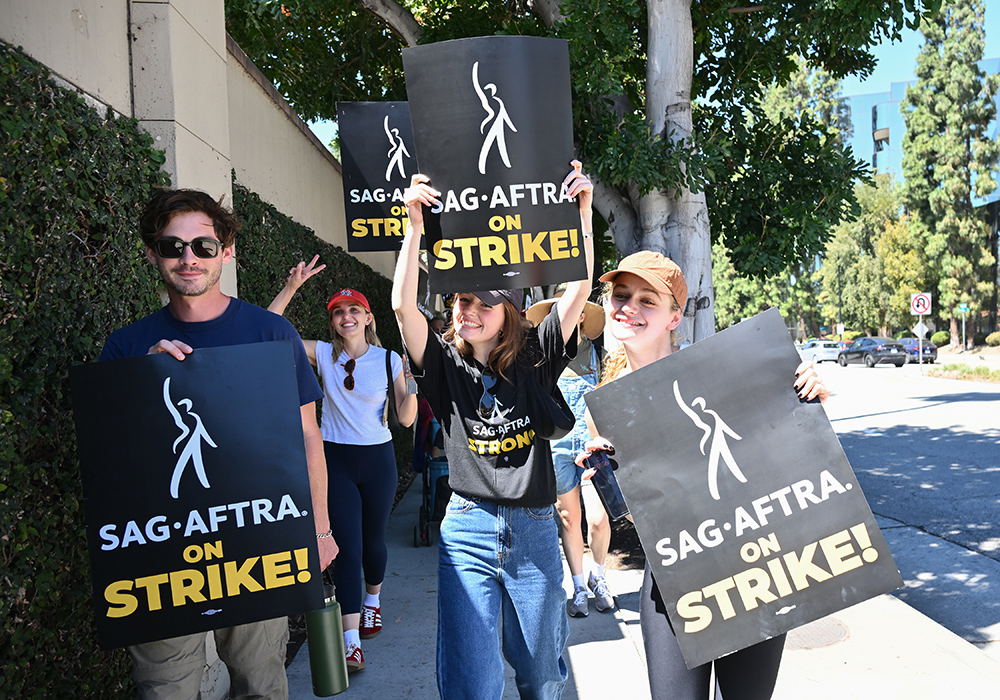WGA And SAG-AFTRA Strike: The Complete Guide To Hollywood's Shutdown

Table of Contents
Understanding the WGA Strike
The WGA strike, which began in May 2023, represents a significant moment in the ongoing struggle for better working conditions and fair compensation for television and film writers.
Key Demands of the WGA
The WGA's core demands center around several key issues threatening the livelihoods and creative freedom of writers:
- Fair Wages and Residuals in the Streaming Era: The rise of streaming services has dramatically altered the revenue model for television and film. Traditional residuals, payments made to writers each time their work is aired, have been significantly diminished, impacting writers' ability to earn a living wage. The WGA is demanding a fairer share of streaming profits.
- Increased Minimum Staffing on Productions: Years of cost-cutting have led to reduced writing staffs, increasing workloads and diminishing creative quality. The WGA seeks to mandate minimum staffing levels to ensure adequate creative input and prevent exploitation.
- Regulations on the Use of Artificial Intelligence (AI) in Writing: The increasing use of AI in generating scripts and other creative content poses a direct threat to writers' jobs and creative control. The WGA is seeking regulations to prevent the unauthorized use of AI and protect writers' intellectual property.
- Transparency in Streaming Viewership Data: Streaming platforms often keep viewership data closely guarded, making it difficult for writers to assess the success of their work and negotiate fair compensation. The WGA demands transparency to ensure fair and accurate payment.
- Improved Working Conditions: The WGA also seeks to improve overall working conditions, including addressing issues such as excessive overtime and unreasonable deadlines.
Impact of the WGA Strike
The WGA strike has had a significant ripple effect throughout the entertainment industry:
- Halted Production: Late-night shows, network television series, and numerous film projects have been put on hold, leading to significant production delays.
- Delayed Release Dates: Numerous films and television shows have experienced delays in their release dates, impacting studios and distributors.
- Financial Strain on Writers and Support Staff: The lack of work has created financial hardship for writers and many members of their support teams.
- Ripple Effects: The strike has impacted various sectors related to the entertainment industry, including catering, transportation, and post-production.
Understanding the SAG-AFTRA Strike
The SAG-AFTRA strike, which began shortly after the WGA strike, represents a powerful show of solidarity and a crucial fight for actors' rights and fair compensation.
Key Demands of SAG-AFTRA
SAG-AFTRA's demands mirror many of the WGA's concerns, while also addressing issues specific to actors:
- Fair Wages and Residuals from Streaming: Similar to the WGA, SAG-AFTRA is demanding a fairer share of streaming revenue to compensate for the diminished residuals actors receive in the streaming era.
- Protection Against AI Misuse: SAG-AFTRA seeks to prevent the unauthorized use of actors' likenesses and voices through AI technology, including deepfakes and AI-generated performances.
- Improved Health and Pension Plans: The union is advocating for improvements to the health and pension plans that support actors throughout their careers.
- Stronger Regulations on Self-Taped Auditions: The increasing prevalence of self-taped auditions places an additional burden on actors, and SAG-AFTRA seeks to regulate these auditions to ensure fair treatment.
- Fair Treatment on Set and Reasonable Working Conditions: The union is addressing issues such as long hours, inadequate safety measures, and harassment on set.
Impact of the SAG-AFTRA Strike
The SAG-AFTRA strike has brought the entertainment industry to a near-complete standstill:
- Complete Production Shutdown: Thousands of actors and crew members are out of work due to the widespread shutdown of film and television production.
- Cancellation and Postponement of Events: Promotional events, premieres, and award shows have been canceled or postponed.
- Uncertainty about Future Releases: The ongoing strike creates significant uncertainty surrounding the future release of films and television shows.
- Economic Implications: Local businesses that depend on Hollywood production have suffered significant economic consequences.
The Combined Impact of the WGA and SAG-AFTRA Strikes
The simultaneous strikes by the WGA and SAG-AFTRA represent an unprecedented shutdown of the entertainment industry.
Unprecedented Industry Shutdown
The combined impact of these strikes is staggering. It's a near-total halt of nearly all film and television production, a situation unseen in decades. This has major implications for the global economy, impacting not only major studios and streaming services but also local businesses and support industries reliant on Hollywood production.
Potential Long-Term Consequences
The long-term consequences of this dual strike are potentially far-reaching. We may see:
- Shifts in Production Models: Studios might explore alternative production methods to mitigate future disruptions.
- Changes in Labor Practices: The outcome of the strikes could lead to significant changes in how writers and actors are compensated and treated.
- Evolution of the Entertainment Industry: The conflict could fundamentally alter the power dynamics within the industry and the relationship between studios, streaming services, and creative talent.
Negotiations and Potential Resolutions
The ongoing negotiations between the unions and the Alliance of Motion Picture and Television Producers (AMPTP) are complex and multifaceted. While there have been some reported discussions and potential compromises, a swift resolution is not guaranteed. The parties are grappling with significant issues related to streaming residuals, AI usage, and fair compensation. Continued monitoring of news sources is crucial to understand any progress made.
The Role of Streaming Services in the Strikes
Streaming services have played a significant role in escalating the tensions that led to the strikes.
The Impact of Streaming on Residuals
The shift from traditional television to streaming has drastically altered the compensation models for writers and actors. The traditional system of residuals, which provided ongoing payments for each broadcast, has been significantly reduced or eliminated in many streaming agreements, leading to decreased earnings and financial insecurity for many creative professionals.
Negotiating with Tech Giants
Negotiating with powerful streaming companies like Netflix, Amazon, and Disney presents significant challenges for the unions. These companies possess substantial economic leverage and have been hesitant to concede on key issues. The negotiations highlight the immense power imbalance in the industry and the need for stronger protections for creative workers in the face of technological disruption.
Conclusion
The WGA and SAG-AFTRA strikes mark a critical moment for the entertainment industry. The demands for fair wages, improved working conditions, and safeguards against AI misuse are not just about individual livelihoods; they're about the future of creative storytelling and a more equitable entertainment landscape. Understanding the nuances of these strikes—from the impact of streaming residuals to the challenges posed by AI—is essential for anyone concerned about the health and future of film and television. Stay informed about the ongoing negotiations and support the efforts of the WGA and SAG-AFTRA to achieve a more sustainable and just entertainment industry. Continue to follow the latest developments on the WGA and SAG-AFTRA strike to stay updated on this crucial moment in Hollywood history.

Featured Posts
-
 How Trumps Actions Reshaped Greenlands Relationship With Denmark
May 10, 2025
How Trumps Actions Reshaped Greenlands Relationship With Denmark
May 10, 2025 -
 Treiler Materialists Ntakota Tzonson Pedro Paskal Kai Kris Evans Se Romantiki Komenti
May 10, 2025
Treiler Materialists Ntakota Tzonson Pedro Paskal Kai Kris Evans Se Romantiki Komenti
May 10, 2025 -
 Nicolas Cage Lawsuit Dismissed Son Weston Remains A Defendant
May 10, 2025
Nicolas Cage Lawsuit Dismissed Son Weston Remains A Defendant
May 10, 2025 -
 Nyt Strands Game 377 Hints And Solutions For March 15
May 10, 2025
Nyt Strands Game 377 Hints And Solutions For March 15
May 10, 2025 -
 Elizabeth Line Accessibility Features For Wheelchair Users
May 10, 2025
Elizabeth Line Accessibility Features For Wheelchair Users
May 10, 2025
